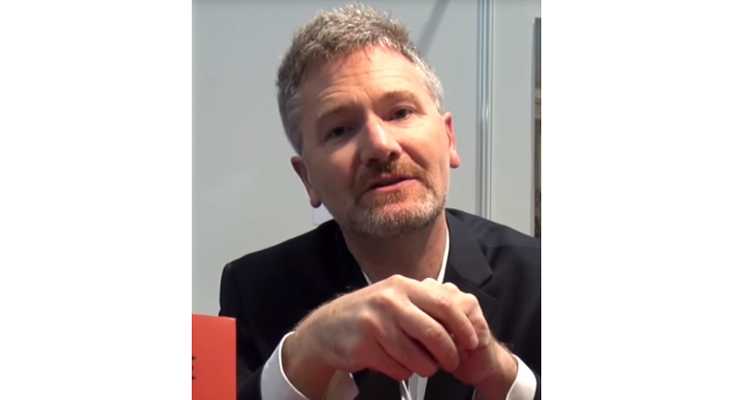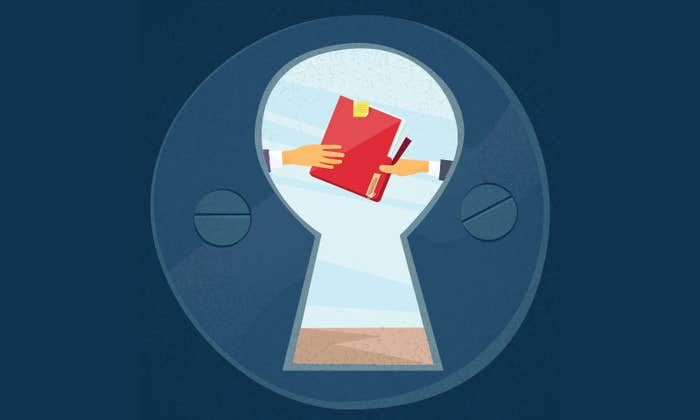Like most of us, Adam Tooze is stuck at home. The British-born economic historian and Columbia University professor of history had been on leave this school year to write a book about climate change. But now he’s studying a different global problem. There are more than 700,000 cases of COVID-19 in the United States and over 2 million infections worldwide. It’s also caused an economic meltdown. More than 18 million Americans have filed for unemployment in recent weeks, and Goldman Sachs analysts predict that U.S. gross domestic product will decline at an annual rate of 34 percent in the second quarter.
Tooze is an expert on economic catastrophes. He wrote the book Crashed: How a Decade of Financial Crises Changed the World, about the 2008 economic crisis and its aftermath. But even he didn’t see this one coming. He hadn’t thought much about how pandemics could impact the economy—few economists had. Then he watched as China locked down the city of Wuhan, in a province known for auto manufacturing, on January 23; as northern Italy shut down on February 23; and as the U.S. stock market imploded on March 9. By then, he knew he had another financial crisis to think about. He’s been busy writing ever since. Tooze spoke with Nautilus from his home in New York City.

What do you make of the fact that, in three weeks, more than 16 million people in the U.S. have filed for unemployment?
The structural element here—and this is quite striking, when you compare Europe, for instance, to the U.S.—is that America has and normally celebrates the flexibility and dynamism of its labor market: The fact that people move between jobs. The fact that employers have the right to hire and fire if they need to. The downside is that in a shock like this, the appropriate response for an employer is simply to let people go. What America wasn’t able to do was to improvise the short-time working systems that the Europeans are trying to use to prevent the immediate loss of employment to so many people.
The disadvantage of the American system that reveals itself in a crisis like this is that hiring and firing is not easily reversible. People who lose jobs don’t necessarily easily get them back. There is a fantasy of a V-shaped recovery. We literally have never done this before, so we don’t know one way or another how this could happen. But it seems likely that many people who have lost employment will not immediately find reemployment over the summer or the fall when business activity resumes something like its previous state. In a situation with a lot of people with low qualifications in precarious jobs at low income, the damage from that kind of interruption of employment in sectors notably which are already teetering on the edge—the chain stores, which are quite likely closing anyway, and fragile malls, which were on the edge of dying—it’s quite likely that this shock will also induce disproportionately large amounts of scarring.
What role has wealth and income inequality played during this crisis?
The U.S. economic system is bad enough in a regular crisis. In one like this, where you shut the entire economy down in a matter of weeks, the damage is barely conceivable. There are huge disparities, all of which ultimately are rooted in social structures of race and class, and in the different types of jobs that people have. The profound inequality in American society has been brought home for us in everyone’s families, where there is a radical disparity between the ability of some households to sustain the education of their children and themselves living comfortably at home. Twenty-five percent of kids in the United States appear not to have a stable WiFi connection. They have smartphones. That seems practically universal. But you can’t teach school on a smartphone. At least, that technology is not there.
Presumably by next year something like normality returns. But forever after we’ll live under the shadow of this having happened.
President Trump wants the economy to reopen by May. Would that stop the economic crisis?
Certainly that is presumably what drives that haste to restart the economy and to lift intense social distancing provisions. There is a sense that we can’t stand this. And that has a lot to do with deep fragilities in the American social system. If all Americans live comfortably in their own homes, with the safety of a regular paycheck, with substantial savings, with health insurance that wasn’t conditional on precarious employment, and with unemployment benefits that were adequate and that were rolled out to most people in this society if they needed them, then there wouldn’t be such a rush. But that isn’t America as we know it. America is a society in which half of families have virtually no financial cushion; in which small businesses, which are so often hailed as the drivers of job creation, the vast majority of owners of them live hand-to-mouth; in which the unemployment insurance system really is a mockery; and with health insurance directly tied to employment for the vast majority of the people. A society like that really faces huge pressures if the economy is shut down.
How is the pandemic-induced economic collapse we’re facing now different from what we faced in 2008?
This is so much faster. Early this year, America had record-low unemployment numbers. And last week or so already we probably broke the record for unemployment in the United States in the period since World War II. This story is moving so fast that our statistical systems of registration can’t keep up. So we think probably de facto unemployment in the U.S. right now is 13, 14, 15 percent. That’s never happened before. 2007 to 2008 was a classic global crisis in the sense that it came out of one particular over-expanded sector, a sector which is very well known for its volatility, which is real estate and construction. It was driven by a credit boom.
What we’re seeing this time around is deliberately, government-ordered, cliff edge, sudden shutdown of the entire economy, hitting specifically the face-to-face human services—retail, entertainment, restaurants—sector, which are, generally speaking, lagging in cyclical terms and are not the kind of sectors that generate boom-bust cycles.
Are we better prepared this time than in 2008?
You’d find it very hard to point to anyone in the policymaking community at the beginning of 2020 who was thinking of pandemic risk. Some people were. Former Treasury Secretary and former Director of the National Economic Council Larry Summers, for example, wrote a paper about pandemic flu several years ago, because of MERS and SARS, previous respiratory illnesses caused by coronaviruses. But it wasn’t top of stack at the beginning of this year. So we weren’t prepared in that sense. But do we know what to do now if we see the convulsions in the credit markets that we saw at the beginning of March? Yes. Have the central banks done it? Yes. Did they use some of the techniques they employed in ’08? Yes. Did they know that you had to go in big and you had to go in heavy and hard and quickly? Yes. And they have done so on an even more gigantic scale than in ’08, which is a lesson learned in ’08, too: There’s no such a thing as too big. And furthermore, the banks, which were the fragile bit in ’08, have basically been sidelined.
You’ve written that the response to the 2008 crisis worked to “undermine democracy.” How so, and could we see that again with this crisis?
The urgency that any financial crisis produces forces governments’ hands—it strips the legislature, the ordinary processes of democratic deliberation. When you’re forced to make very dramatic, very rapid decisions—particularly in a country as chronically divided as the U.S. is on so many issues—the risk that you create opportunities for demagogues of various types to take advantage of is huge. We know what the response of the Tea Party was to the ’08, ’09 economic crisis. They created an extraordinarily distorted vision of what had happened and then rode that to see extraordinary influence over the Republican party in the years that followed. And there is every reason to think that we might be faced with similar stresses in the American political system in months to come.
The U.S. economic system is bad enough in a regular crisis. In one like this, where you shut the entire economy down in a matter of weeks, the damage is barely conceivable.
How should we be rethinking the economy to buffer against meltdowns like this in the future?
We clearly need to have a far more adequate and substantial medical capacity. There’s no alternative to a comprehensive publicly backstopped or funded health insurance system. Insofar as you haven’t got that, your capacity to guarantee the security in the most basic and elementary sense of your population is not there. When you have a system in which one of the immediate side effects, in a crisis like this, is that large parts of your hospital system go bankrupt—one of the threats to the American medical system right now—that points to something extraordinarily wrong, especially if you’re spending close to 18 percent of GDP on health, more than any other society on the planet.
What about the unemployment insurance system?
America needs to have a comprehensive unemployment insurance system. It can be graded by local wage rates and everything else. But the idea that you have the extraordinary disparities that we have between a Florida and a Georgia at one end, with recipiency rates in the 11, 12, 13, 14, 15 percent, and then states which actually operate an insurance system, which deserve the name—this shouldn’t be accepted in a country like the U.S. We would need to look at how short-time working models might be a far better way of dealing with shocks of this kind, essentially saying that there is a public interest in the continuity of employment relationships. The employer should be investing in their staff and should not be indifferent as to who shows up for work on any given day.
What does this pandemic teach us about living in a global economy?
There are a series of very hard lessons in the recent history of globalization into which the corona shock fits—about the peculiar inability of American society, American politics, and the American labor market to cushion shocks that come from the outside in a way which moderates the risk and the damage to the most vulnerable people. If you look at the impact of globalization on manufacturing, industry, inequality, the urban fabric in the U.S., it’s far more severe than in other societies, which have basically been subject to the same shock. That really needs to raise questions about how the American labor market and welfare system work, because they are failing tens of millions of people in this society.
You write in Crashed not just about the 2008 crisis, but also about the decade afterward. What is the next decade going to look like, given this meltdown?
I have never felt less certain in even thinking about that kind of question. At this point, can either you or I confidently predict what we’re going to be doing this summer or this autumn? I don’t know whether my university is resuming normal service in the fall. I don’t know whether my daughter goes back to school. I don’t know when my wife’s business in travel and tourism resumes. That is unprecedented. It’s very difficult against that backdrop to think out over a 10-year time horizon. Presumably by next year something like normality returns. But forever after we’ll live under the shadow of this having happened. Every year we’re going to be anxiously worrying about whether flu season is going to be flu season like normal or flu season like this. That is itself something to be reckoned with.
How will anxiety and uncertainty about a future pandemic-like crisis affect the economy?
When we do not know what the future holds to this extent, it makes it very difficult for people to make bold, long-term financial decisions. This previously wasn’t part of the repertoire of what the financial analysts call tail risk. Not seriously. My sister works in the U.K. government, and they compile a list every quarter of the top five things that could blow your departmental business up. Every year pandemics are in the top three. But no one ever acted on it. It’s not like terrorism. In Britain, you have a state apparatus which is geared to address the terrorism risk because it’s very real—it’s struck many times. Now all of a sudden we have to take the possibility of pandemics that seriously. And their consequences are far more drastic. How do we know what our incomes are going to be? A very large part of American society is not going to be able to answer that question for some time to come. And that will shake consumer confidence. It will likely increase the savings rate. It’s quite likely to reduce the desire to invest in a large part of the U.S. economy.
Max Kutner is a journalist in New York City. He has written for Newsweek, The Boston Globe, and Smithsonian. Follow him on Twitter @maxkutner.
Lead image: Straight 8 Photography / Shutterstock


























